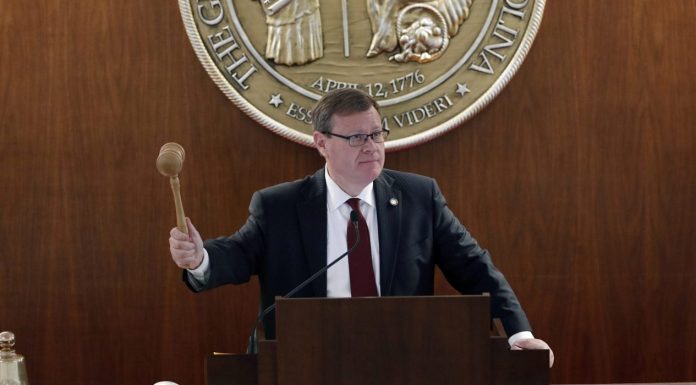(Headline USA) Left-wing judges in North Carolina struck down the state’s latest photo voter identification law on Friday, agreeing with activist groups that rules established by the GOP-led legislature following passage of a 2018 ballot referendum were racially biased.
Two of the three trial judges declared the December 2018 law is unconstitutional, even though it was designed to implement a photo voter ID mandate added to the North Carolina Constitution in a referendum just weeks earlier.
They claimed the law intentionally discriminates against black voters, violating their equal protections.
The law “was motivated at least in part by an unconstitutional intent to target African–American voters,” Superior Court Judges Michael O’Foghludha and Vince Rozier wrote in their 100-page majority opinion.
“Other, less restrictive voter ID laws would have sufficed to achieve the legitimate nonracial purposes of implementing the constitutional amendment requiring voter ID, deterring fraud, or enhancing voter confidence.”
But Republicans in the state sharply criticized the verdict as being itself politically motivated.
“Holding that the legislature acted with racial intent while saying that there is zero evidence of any racial intent from any of the legislators is completely ridiculous,” said Michael Whatley, chair of the state Republican Party, in a statement. “This is why we need Conservative Judges.”
The majority decision, which followed a three-week trial in April, is now likely headed to a state appeals court, which had previously blocked the law’s enforcement last year while the case was heard. The law remains unenforceable with this ruling.
With a similar lawsuit in federal court set to go to trial this January and another state court lawsuit now on appeal, it’s looking more unlikely that a voter ID mandate for in-person and absentee balloting will happen in the 2022 elections.
Republicans have said voter ID laws are needed to build public confidence in elections and to prevent voter fraud, which remains rare nationwide.
But many Democrats inexplicably claim the mandates as attempts at voter suppression—even as they, themselves, target minorities for oppression through vaccine passports and mandates that, in some cases, prevent unvaccinated individuals from holding jobs or receiving promotions.
In July 2016, a federal appeals court struck down several portions of a 2013 North Carolina elections law that included a voter ID mandate, saying GOP lawmakers had written them with “almost surgical precision” to discourage voting by black voters, who tend to support Democrats.
Ironically, evidence suggests that Democrats’ recent authoritarian streak and ongoing power grabs may be driving more black voters to vote Republican.
Lawyers for the race-baiting activists who sued over the 2018 law claimed it suffered the same racial defects as the 2013 law, which only saw the light of day in one round of elections—the 2016 primaries.
Six voters—five Black and one biracial—sued in Wake County court on the same day that GOP lawmakers overrode Democratic Gov. Roy Cooper’s veto of the 2018 voter ID bill.
During the trial, some of the plaintiffs testified about their difficulties in obtaining an ID or voting when the earlier photo ID law was in effect.
Lawyers for the GOP said all voters would continue to be able to vote under the 2018 law.
The plaintiffs’ case emphasized analysis from a University of Michigan professor who said black voters were 39% more likely to lack a qualifying photo ID than white registered voters. The analysis, however, left out data on some categories of qualifying IDs.
GOP legislative leaders said the latest ID rules were approved with substantial Democratic support and improved to retain ballot access while ensuring only legal citizens can vote.
The categories of qualifying IDs were greatly expanded compared to the 2013 law to include college student and government-employee IDs.
Free IDs also are available from county elections boards or at early-voting sites, and people without IDs can still vote if they fill out a form at the voting precinct.
In a dissenting opinion, Judge Nathaniel Poovey wrote that passage of the voter ID law falls in line with the state constitution, citing its support from several black legislators and the citizens voting for the constitutional referendum.
“Competence evidence before this three-judge panel does not suggest our legislature enacted this law with a racially discriminatory intent,” Poovey wrote.
About three dozen states have laws requesting or requiring voters to show some form of identification at the polls, and about half of these states want photo ID only, according to the National Conference of State Legislatures.
Adapted from reporting by the Associated Press

